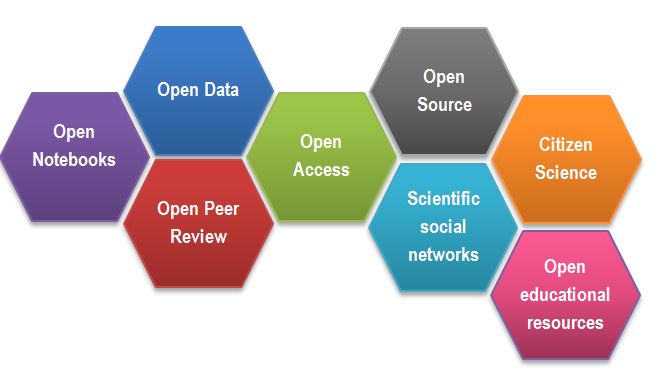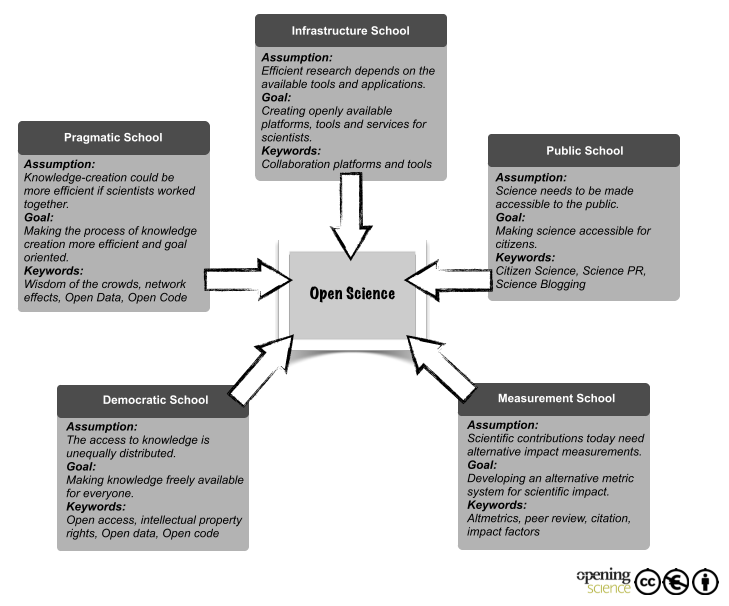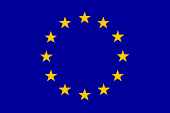What is Open Science? Introduction
Open Science represents a new approach to the scientific process based on cooperative work and new ways of diffusing knowledge by using digital technologies and new collaborative tools (European Commission, 2016b:33). The OECD defines Open Science as: “to make the primary outputs of publicly funded research results – publications and the research data – publicly accessible in digital format with no or minimal restriction” (OECD, 2015:7), but it is more than that. Open Science is about extending the principles of openness to the whole research cycle (see figure 1), fostering sharing and collaboration as early as possible thus entailing a systemic change to the way science and research is done.
 **Figure 1. Promoting openness at different stages of the research process (Open Science and Research Initiative, 2014)**
**Figure 1. Promoting openness at different stages of the research process (Open Science and Research Initiative, 2014)**
Open Science is frequently defined as an umbrella term that involves various movements aiming to remove the barriers for sharing any kind of output, resources, methods or tools, at any stage of the research process. As such, open access to publications, open research data, open source software, open collaboration, open peer review, open notebooks, open educational resources, open monographs, citizen science, or research crowdfunding, fall into the boundaries of Open Science. Even though, especially for the library and information domain, the focus is usually placed on two of these movements: Open Research Data and Open Access to scientific publications .

‘Open Science’ is not a new concept itself, although the agreement on this term and its widespread use is relatively recent. Many other terms have been used, and are still used, to refer to the transformation of scientific practice (Science 2.0, e-Science, etc.). But the term ‘Open Science’ has been preferred by the stakeholders, as it has been stated in the report of the European Commission’s 2014 public consultation on ‘Science 2.0: Science in Transition’ (European Commission, 2015).
The rationale behind Open Science is complex but one of its main arguments is sociological: scientific knowledge is a product of social collaboration and its ownership belongs to the community. From an economic point of view, scientific outputs generated by public research are a public good that everyone should be able to use at no cost. There are in fact multiple approaches to the term and definition of Open Science, that Fecher and Friesike (2014) have synthesized and structured by proposing five Open Science schools of thought (see figure 3).
 **Figure 3. Five Open Science schools of thought (Fecher and Friesike, 2014)**
**Figure 3. Five Open Science schools of thought (Fecher and Friesike, 2014)**
Most of these assumptions are not new, as the tradition of openness itself is at the roots of science, but the current developments of information and communication technologies have transformed the scientific practices to a level that requires a different approach to research that must be understood by all the agents involved: researchers, institutions, policy makers, publishers, businesses and society in general.
It is argued that in the long term, the adjective Open should not be necessary, as science will be open by default, and it would be simply named Science.





 Unless otherwise stated, all materials created by the FOSTER consortium are licensed under a CREATIVE COMMONS
ATTRIBUTION 4.0 INTERNATIONAL LICENSE.
Unless otherwise stated, all materials created by the FOSTER consortium are licensed under a CREATIVE COMMONS
ATTRIBUTION 4.0 INTERNATIONAL LICENSE.
 This project has received funding from the European Union’s Seventh Framework Programme for research,
technological development and demonstration under grant agreement no 612425.
This project has received funding from the European Union’s Seventh Framework Programme for research,
technological development and demonstration under grant agreement no 612425.